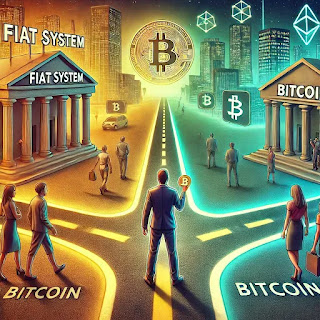The Last Bank Account You’ll Ever Need
We were born into a system where banks held the keys—not just to our money, but to our autonomy. They could freeze your account, block your transaction, or quietly bleed you dry through fees and inflation. And we accepted it because we were told there was no alternative.
Since 1971, when we fully unpegged from gold, money has been backed by nothing but promises, enforced by policy. The result? A slow bleed of purchasing power and a growing dependency on middlemen.
But then Bitcoin arrived. And with it came something revolutionary: the chance to be your own bank.
Self-custody isn't just a technical term. It's a declaration of independence. It's the difference between owning your wealth and asking permission to use it. When you hold your own keys, you're opting out of a rigged game and choosing freedom over convenience.
Let’s get into it.
Think of this like building a castle. You start with the foundation: understanding self-custody. Then you add the walls: hardware wallets. And finally, the moat: multisig. Each layer is a choice to protect what’s yours.
A self-custodied Bitcoin wallet is the modern vault. But instead of being buried underground with a steel door, it lives in your pocket, encrypted, secure, and immune to the whims of governments or banks. When you use a hardware wallet like a Trezor, Ledger, or Coldcard, you're putting a digital padlock on your wealth that only you control. Your keys never touch the internet. Your Bitcoin never leaves your command.
When FTX collapsed, thousands learned the hard way. Trusting an exchange is like giving your house keys to a stranger and hoping they don’t throw a party while you're gone. The bitter truth? If you don’t hold it, you don’t own it.
For those looking to go deeper, multisig setups offer an even higher level of protection. By requiring multiple keys to move funds, you're spreading risk across people, locations, or devices. Think of it like splitting the combination to your safe among trusted allies. It's perfect for inheritance planning, business holdings, or just sleeping better at night.
Cold storage isn't just a technical best practice. It's a philosophical stance. It's digital homesteading. It’s the difference between renting a room in someone else's house and owning land outright. One makes you a guest. The other makes you a sovereign. When you unplug your coins from the internet and lock them away, you're stepping off the plantation of fiat finance and building your fortress of sovereignty.
No more gatekeepers. No more frozen accounts. No more begging for permission to access what's already yours. With Bitcoin self-custody, the power shifts back to you.
And yeah, there are myths. "What if I lose my seed phrase?" you ask. Simple: don’t. Make backups. Use steel plates. Educate yourself. The biggest threat isn't complexity. It's complacency. With a little foresight and practice, self-custody becomes second nature.
This is the last bank account you’ll ever need. One that no one can touch, tamper with, or take away. It's not stored in some bank server farm, but in your own encrypted vault, accessible only by you, governed only by you, and protected by the most secure monetary network ever created.
This isn’t just a wallet upgrade. It’s a mindset shift. It’s about exiting their system and entering your own.
Once you go cold, you never go back. Because once you taste true financial freedom, there’s no substitute.
Tick tock. Next block.
Ready to take the leap? Grab a hardware wallet. Learn the basics. Stack your sats. And start living outside the system.




Comments
Post a Comment